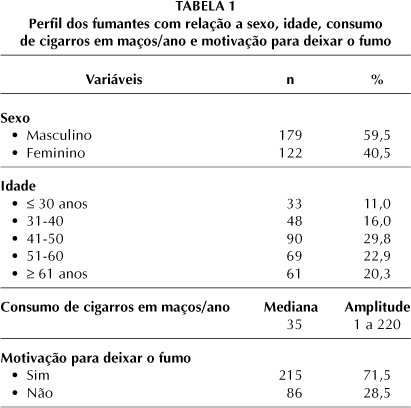Introduction: The University Hospital is reference in the city of Rio Grande, in the State of Rio Grande do Sul, Southeast part of Brazil, for chronic lung disease patients, with a major smoking cessation program. Aim: The purpose of this work was to analyze the utilization of Fagerström Tolerance Questionnaire to assess the nicotine dependence of smoking patients with reference to individualization of treatment. Material and Method: The authors used the Fagerström Tolerance Questionnaire (FTQ) in daily smoking adult patients from the Medical Clinic and Chest Medicine Units of the University Hospital and Rio Grande Santa Casa Hospital, during the period of one year. Three hundred and one valid questionnaires were filled out, 40.5% by females and 59.5% by males. Mean age was 48.6 years. The score of the questionnaires classified patients by dependence into five degrees: very low, low, medium, high, and very high. Results: 54.9% belong to the group of high nicotine dependence (score <FONT FACE=Symbol>³</FONT> 6), with a significant correlation of elevated nicotine dependence and cigarettes per day or time to the first cigarette of the day (p < 0.001). Conclusion: The use of the FTQ demonstrated ease of administration and more than 50% of the patients with a degree of chemical dependence that anticipate discomfort at cessation of smoking and need of treatment to control the withdrawal symptoms.
Tobacco use disorder; Questionnaires; Substance withdrawal syndrome; Smoking










